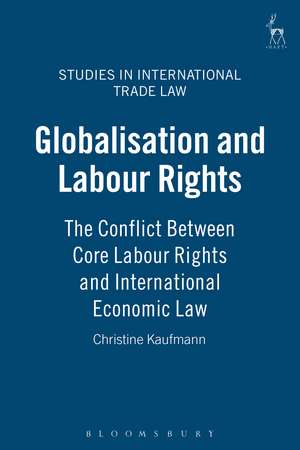Globalisation and Labour Rights: The Conflict Between Core Labour Rights and International Economic Law: Studies in International Trade and Investment Law
Autor Christine Kaufmannen Limba Engleză Hardback – 16 ian 2007
Din seria Studies in International Trade and Investment Law
- 13%
 Preț: 195.38 lei
Preț: 195.38 lei - 30%
 Preț: 901.55 lei
Preț: 901.55 lei - 27%
 Preț: 444.01 lei
Preț: 444.01 lei - 37%
 Preț: 510.83 lei
Preț: 510.83 lei - 30%
 Preț: 512.69 lei
Preț: 512.69 lei - 19%
 Preț: 303.80 lei
Preț: 303.80 lei - 22%
 Preț: 231.24 lei
Preț: 231.24 lei - 30%
 Preț: 601.63 lei
Preț: 601.63 lei - 30%
 Preț: 781.55 lei
Preț: 781.55 lei - 13%
 Preț: 238.76 lei
Preț: 238.76 lei - 30%
 Preț: 570.11 lei
Preț: 570.11 lei - 30%
 Preț: 1016.59 lei
Preț: 1016.59 lei - 30%
 Preț: 600.15 lei
Preț: 600.15 lei - 30%
 Preț: 778.68 lei
Preț: 778.68 lei - 30%
 Preț: 955.20 lei
Preț: 955.20 lei - 30%
 Preț: 540.80 lei
Preț: 540.80 lei - 30%
 Preț: 956.09 lei
Preț: 956.09 lei - 30%
 Preț: 543.08 lei
Preț: 543.08 lei - 30%
 Preț: 599.66 lei
Preț: 599.66 lei - 26%
 Preț: 777.71 lei
Preț: 777.71 lei - 22%
 Preț: 269.66 lei
Preț: 269.66 lei - 22%
 Preț: 266.30 lei
Preț: 266.30 lei - 18%
 Preț: 299.86 lei
Preț: 299.86 lei - 18%
 Preț: 307.97 lei
Preț: 307.97 lei - 18%
 Preț: 306.26 lei
Preț: 306.26 lei - 18%
 Preț: 305.53 lei
Preț: 305.53 lei - 27%
 Preț: 447.39 lei
Preț: 447.39 lei - 18%
 Preț: 321.48 lei
Preț: 321.48 lei - 30%
 Preț: 512.54 lei
Preț: 512.54 lei - 30%
 Preț: 511.40 lei
Preț: 511.40 lei -
 Preț: 374.55 lei
Preț: 374.55 lei
Preț: 573.70 lei
Preț vechi: 818.81 lei
-30% Nou
Puncte Express: 861
Preț estimativ în valută:
109.77€ • 114.92$ • 90.83£
109.77€ • 114.92$ • 90.83£
Carte tipărită la comandă
Livrare economică 05-19 aprilie
Preluare comenzi: 021 569.72.76
Specificații
ISBN-13: 9781841135991
ISBN-10: 1841135992
Pagini: 416
Dimensiuni: 156 x 234 x 32 mm
Greutate: 0.77 kg
Editura: Bloomsbury Publishing
Colecția Hart Publishing
Seria Studies in International Trade and Investment Law
Locul publicării:London, United Kingdom
ISBN-10: 1841135992
Pagini: 416
Dimensiuni: 156 x 234 x 32 mm
Greutate: 0.77 kg
Editura: Bloomsbury Publishing
Colecția Hart Publishing
Seria Studies in International Trade and Investment Law
Locul publicării:London, United Kingdom
Caracteristici
This book examines the tensions between core labour rights as defined by the International Labour Organisation, and the interests of international economic institutions (e.g. WTO, IMF, World Bank, OECD).
Notă biografică
Christine Kaufmann is Professor of Law and Co-Director of the Institute of International and Comparative Constitutional Law at the University of Zurich.
Cuprins
Introduction: Setting Out the Problems1. The Legal Framework for Core Labour Rights2. International Economic Organisations and Core Labour Rights: Conflicting Interests3. Cross-border Economic Activities: Multinational Enterprises and the Linkage Debate4. Reconciling Conflicting Interests: The Roles of Nation States and the International Community5. Conclusions
Recenzii
This book by Christine Kaufmann is timely as it deals with 'core labour rights' and the effects of globalisation.Quite uncommon for lawyers, Kaufmann provides the economic rationale underlying national economic and social policies. She also provides a comprehensive outlook on the Swiss system relating to labour rights, which should be extremely helpful for students of comparative law.Her examination of social labelling programmes in the context of the Agreement on Technical Barriers to Trade and the Government Procurement Agreement is extremely interesting.The book is useful to students and scholars of international law. It is well-structured and one can follow the line of thought in an adequate manner... It would be fair to say that this book offers a solid and detailed inquiry into the conflicts between core labour rights and international economic law.
...important and scholarly.
Globalisation and Labour Rights can be unreservedly recommended to lawyers and economists alike, not least because of its comprehensive coverage..for economists and lawyers it provides a broad overview and shows that international commercial law can and must take account of labour law..
Kaufmann's book is a well-documented contribution, which presents an academically attractive thesis...Academic contributions such as Kaufmann's are of most interest in that they define strategies to reconcile international trade law with social values.
...important and scholarly.
Globalisation and Labour Rights can be unreservedly recommended to lawyers and economists alike, not least because of its comprehensive coverage..for economists and lawyers it provides a broad overview and shows that international commercial law can and must take account of labour law..
Kaufmann's book is a well-documented contribution, which presents an academically attractive thesis...Academic contributions such as Kaufmann's are of most interest in that they define strategies to reconcile international trade law with social values.
Descriere
This book examines the tension between core labour rights defined by the International Labour Organisation and the interests of economic institutions.
